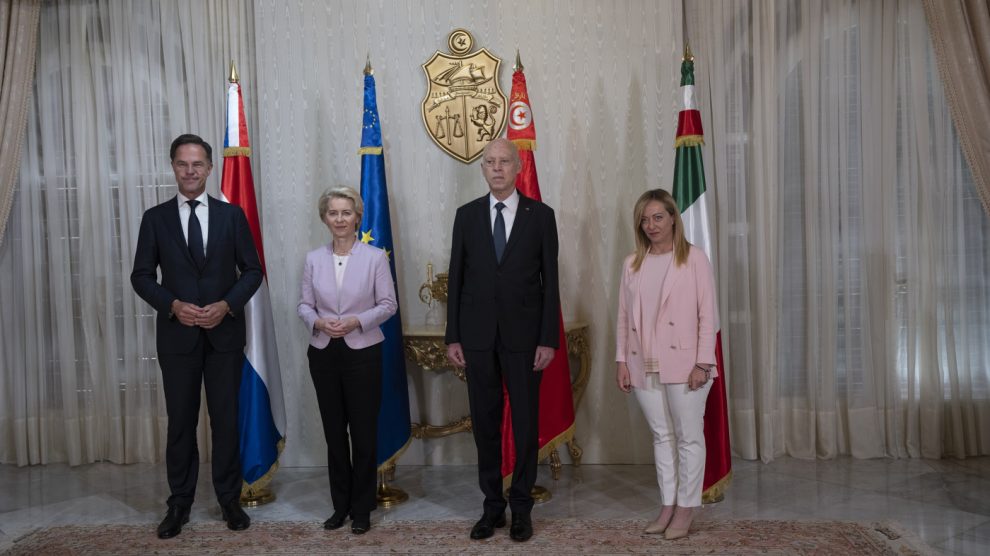Tunis trip: the day after. On Sunday, as she had promised, Italian Prime Minister Giorgia Meloni returned to the Tunisian capital flanked by European Commission President Ursula von der Leyen and Dutch PM Mark Rutte. The trio met with President Kais Saied and promised upwards of €1 billion in financial aid in exchange for harsher border control measures – “as soon as the necessary agreement is found,” as the EU leader said.
- Their trip happened shortly after the EU ministers’ historic agreement on a new migration deal, which takes into account Italy’s request to aid first-entry countries and reach out to boost stability and development in countries of origin (including through financial aid).
The deliverables: in a joint press conference, President von der Leyen announced that the EU and Tunis would work together on a “comprehensive five-pillar package” which includes “increased trade and investment” as well as “mutually-beneficial energy cooperation.”
- Brussels is mulling up to €900 million in macro-financial assistance, she said, and could deliver up to €150 million in budget support “right now.”
- An additional €100 million is available for border management, search and rescue, anti-smuggling measures and parallel initiatives.
Mixed results… The bulk of the EU money is conditional on structural reforms to make Tunisia’s economy more resilient, in line with the International Monetary Fund requirements to unlock a nearly €2 billion loan. However, President Saied is weary of popular backlash if he removes the government subsidies aiding the crisis-ridden Tunisians – and is still resisting what he calls “diktats”.
- Despite agreeing to work on cooperation, he’s also not enthusiastic about the migration side of things. Shortly before meeting with the EU leaders, speaking from the port city of Sfax – a major pole for departing migrants – he also promised not to turn Tunisia into a border guard for other countries, essentially rejecting the spirit of the EU’s initial offer.
… and ongoing pressure. The Meloni government has been mediating between Western allies and Tunisia and pushing the formers to adopt a more pragmatic stance on releasing the funds, arguing that letting the country slide into a worsening crisis for the sake of excessive red tape would ultimately be counterproductive for all.
- Rome believes it would be better to consider a hybrid solution: immediately releasing part of the funds and keeping the rest tied to reforms to stave off the worst effects of Tunisia’s economic crisis.
- Rating agencies keep downgrading the country’s profile as the risk it defaults on its own debt intensifies.
Working with the US. During his trip to the United States, Foreign Minister Antonio Tajani raised the issue with State Secretary Antony Blinken, later noting that the two had “agreed on actions […] to achieve peace and stability in the Mediterranean region,” including Tunisia, which is a “priority” for Italy, as he explained to his counterpart.
- “We very much share Italy’s concerns [and] appreciate the work” that PM Meloni and the other European leaders did in visiting Tunis, remarked Secretary Blinken. “It’s clear [the country] needs assistance if it wants to avoid falling down the proverbial economic cliff,” he argued, noting that Tunisia still requires something “comprehensive, that in our judgement the IMF can best provide,” to get the country on a sustainable and positive path.
- Though highlighting that Washington would welcome the Tunisian government presenting a revised plan to the IMF, and the importance of stabilising the region, Secretary Blinken stressed that all decisions are only Tunisia’s to make.
- FM Tajani was also supposed to touch upon the issue with IMF Managing Director Kristalina Georgieva, to reiterate the urgency of reaching an agreement and highlight Italy’s hybrid solution. However, in light of the passing of Silvio Berlusconi, FM Tajani (who’s coordinator of the late leader’s party) anticipated his return to Italy and wast’t able to meet with Ms Georgieva.
Think strategically. As Defence Minister Guido Crosetto told Il Messaggero on Monday, multiple paths must be kept open to prevent Tunis from defaulting on its own debt. The reasons are more systemic than just the economic crisis, as he argued. From a European standpoint, it’s not only about an uptick in migrant numbers: it’s about the future of the African continent and its rapid demographic growth.
- Inaction is tantamount to leaving Africa under the influence of Russia and China, which “want to exploit it just as European colonialists did a century ago,” he stressed.





